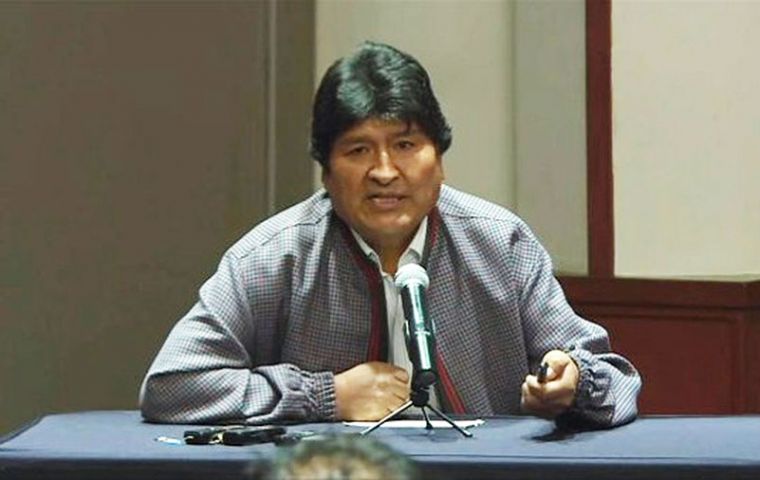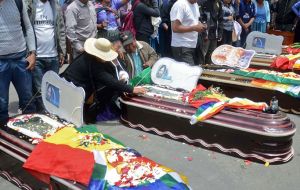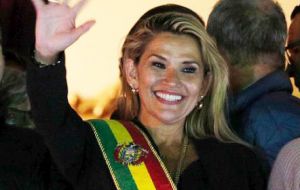MercoPress. South Atlantic News Agency
Morales calls on the international community to stop a “genocide” in Bolivia
 “This massacre ... is part of a genocide that is happening in our beloved Bolivia,” Morales, the country's first indigenous president, told a press conference in Mexico
“This massacre ... is part of a genocide that is happening in our beloved Bolivia,” Morales, the country's first indigenous president, told a press conference in Mexico  At least 32 people have been killed in violence since the Oct 20 election, according to the IACHR.
At least 32 people have been killed in violence since the Oct 20 election, according to the IACHR.  The unrest has intensified since right-wing senator Jeanine Añez declared herself interim president on Nov 12, triggering protests by Morales supporters.
The unrest has intensified since right-wing senator Jeanine Añez declared herself interim president on Nov 12, triggering protests by Morales supporters. Former president Evo Morales urged the international community on Wednesday to intervene to stop what he called a “genocide” in Bolivia, where at least 32 people have died in violence that erupted after his disputed re-election.
“This massacre ... is part of a genocide that is happening in our beloved Bolivia,” Morales, the country's first indigenous president, told a press conference in Mexico City, where he fled after resigning the presidency 10 days ago amid mounting unrest sparked by his contested re-election to a controversial fourth term on Oct 20.
”I call on the IACHR (Inter-American Commission on Human Rights) and the UN to condemn and stop this massacre of my indigenous brothers, who are simply asking for peace, democracy and respect for human life,“ the leftist leader said in a separate message on Twitter.
At least 32 people have been killed in violence since the Oct 20 election, according to the IACHR. The unrest has intensified since right-wing senator Jeanine Añez declared herself interim president on Nov 12, triggering protests by Morales supporters.
Showing a video with graphic scenes of dead and wounded protesters, Morales condemned the ”brutal repression“ by the military.
The deadliest clashes occurred on Friday in the central city of Cochabamba, where nine people were killed in a confrontation between Morales backers and the security forces.
Eight others were killed on Tuesday in clashes between security forces and protesters around a fuel plant near La Paz, according to Bolivian authorities.
Anez vowed to call new elections on Wednesday. But she has insisted Morales will not be allowed to participate, saying if he returns to Bolivia he will instead face justice for his alleged crimes.
Morales denied wrongdoing and said he was being persecuted for leading a pro-poor, pro-indigenous government and nationalizing the country's gas and other natural resources.
”It pains me, because we managed to grow Bolivia's economy, with so much effort. We had lifted the country from poverty, and now they're destroying it,“ he said.
”Some people can't accept having Indians in power.“
Despite his resignation, Morales reiterated that he still considers himself Bolivia's legitimate president.
Morales says he resigned under pressure from the army that amounted to a ”coup,” and that his resignation was never duly accepted by Congress, where his party still holds a majority.




Top Comments
Disclaimer & comment rulesCommenting for this story is now closed.
If you have a Facebook account, become a fan and comment on our Facebook Page!